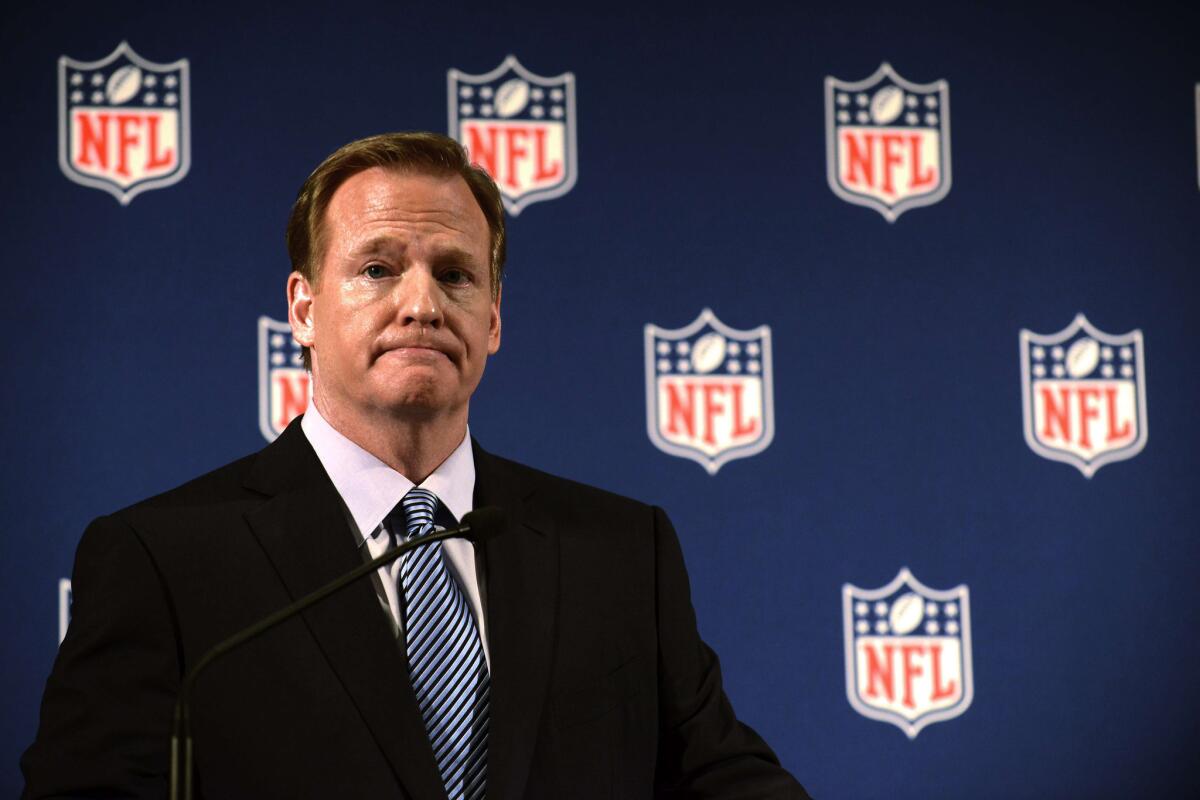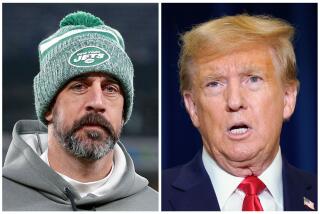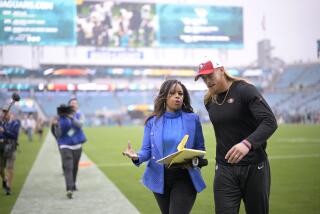Opinion: For NFL to change, it’s up to us to confront the sport’s moral hazards

In August I pledged in these pages to stop following football because of my misgivings about the game’s corruptions. Almost immediately, those corruptions exploded into public view as never before. Disturbing images and descriptions of off-the-field violence committed by star players, as well as the NFL’s admission that it now anticipates 3 in 10 former players will suffer brain damage, recast the league as scandal central.
Most of the media onslaught has aimed at demanding accountability of players, team officials and, in particular, NFL commissioner Roger Goodell. Goodell’s Sept. 19 press conference offered a spectacle of calculated contrition (on his part) and ritualized sanctimony (on the part of the media) more commonly associated with disgraced political leaders.
Amid all this recrimination, though, one group has yet to be held accountable: the fans. Instead, sports pundits have acted as fan proxies, excoriating obvious scapegoats while relieving fans of any inconvenient feelings of responsibility.
But the NFL generates nearly $10 billion annually. More than half that sum comes from broadcast revenues. This means that even those who simply watch the games on television subsidize the endeavor.
The fans are the ones, ultimately, who pay the outrageous salaries of men such as former Baltimore Ravens running back Ray Rice, who was caught on video slugging his then-fiancee, and Adrian Peterson of the Minnesota Vikings, who has been indicted on child abuse charges because he punished his son with a switch. The fans empower billionaire team owners to demand taxpayer money for shiny new stadiums. And, most galling of all, they are the reason Goodell made $44 million last year.
Members of the sports media -- particularly the newer generation of sports pundits -- rarely make this point. To do so would violate a basic precept of their programming, which is to keep fans in a continuous state of aggrieved victimhood. Like the political demagogues just down the dial, sports talk-show hosts build their fan base by delivering the same seductive message over and over: You, the little guy, are just an innocent bystander in all this; moreover, you the beleaguered fan are being disregarded, pushed around, ripped off.
It can’t help that many sports pundits are huge fans themselves, nor that they are professionally invested in the success of the NFL. ESPN, for one, is officially in partnership with the league. If the commentators began pointing out that fans were complicit in the league’s corruptions, the logical conclusion would be that for football to change, the fans have to change too -- up to and including withholding their support. If fans took them to heart, though, the pundits might be out of a job.
Yes, the sports media has been tough on the NFL over the last month. But the central message has been to vilify a few bad actors (Rice, Peterson, Goodell), and to suggest that the NFL will be cured once they’re gone.
Like the NFL itself, the sports media is distracting fans from the game’s dark truths. If you consume football, your cheers, your viewership and your dollars are supporting a profoundly dangerous workplace, an industry that enriches billionaire owners at the expense of struggling cities, and a sport that distorts our attitudes toward violence, gender and race.
Football will be redeemed only if those who love the sport and revere the players confront these moral hazards. Some fans will fight to reform the game. Others will choose as I have, reluctantly, to turn away. But all of us need to face the fact that the football industry in this country will only change when we hold ourselves accountable for that change.
Steve Almond is the author of “Against Football.” Follow him on Twitter at @stevealmondjoy
Follow the Opinion section on Twitter @latimesopinion
More to Read
A cure for the common opinion
Get thought-provoking perspectives with our weekly newsletter.
You may occasionally receive promotional content from the Los Angeles Times.






